Attacking Prison Society
Michel Foucault and the Prisons Information Group
Introduction
The following two texts are taken from the recently released anthology, Intolerable: Michel Foucault and the Prisons Information Group, which collects writings related to the group’s anti-carceral activity in the early 1970s.
“The Great Confinement” was first published in March 1972, at a time when Michel Foucault was steeped in activities on behalf of the Prisons Information Group (GIP). The interview appeared just two weeks after the completion of his Collège de France course Penal Theories and Institutions, which traced the constitution of a new system of repression defined by a state apparatus in the royal justice of seventeenth-century France. A marxisant moment marked Foucault’s intellectual and political contributions at the time. This moment is evident in his references to confinement as a response to the problems of unemployment and popular insurrections in nascent capitalism, in his treatment of the threat of incarceration as a way of putting downward pressure on wages, in his emphasis on the interiorization (up to a point) of bourgeois ideology in the nineteenth-century proletariat, and his affirmation of the necessity of changes in class relations as a condition for transformations in imprisonment. The same is no less true of the preface below to the very first report of the newly-formed GIP, “Investigation into Twenty Prisons.” Penned by Foucault, but published under the collective name of the GIP, the preface announced the reactivation of a form of militant investigation that had a long and rich history in Marxism.
When asked about the relationship between his philosophical work and his engagement in the GIP, Foucault responds evasively. “I would really like us,” he tells Niklaus Meienberg, “to establish no relationship between my theoretical work and my work in the GIP.” Note the careful wording: Foucault does not deny a relationship between his theoretical and political practices. He simply asks that his interviewer and readers not form any such relationship. Despite refusing, in this moment, to connect his intellectual work with his political activity, Foucault concedes “that there probably is a relationship.” Yet he muddies the waters further when he reproaches Meienberg later with the following comment: “It bothers me when you suggest that there is no relationship between History of Madness and my work in the GIP.” Does this complaint not contradict Foucault’s initial request to Meienberg to keep his theoretical and practical registers separate? The reproach is baffling for still another reason: although a recording or transcript of the interview may tell a different story, in the published version of the interview Meienberg does not even hint at disconnecting History of Madness and Foucault’s engagement with the GIP.
What is going on here? Why all this evasive maneuvering and back and forth, as if Foucault had lost sight of his starting point? He knew that there was a profound connection between his theory and practice, as indicated by his ultimate frustration with Meienberg for supposedly disconnecting these domains. Yet Foucault downplayed that connection out of a tacit anxiety about how it might be interpreted. To encourage a connection between his theoretical production and his political practices in a militant collective risked decentering prisoners and the collective practices of the GIP for the sake of spotlighting his own intellectual endeavors. Foucault also did not want to be seen as instrumentally using the GIP and, by extension, prisoners for his own narrow research purposes. He did not want to invite the charge of treating prisoners as mere objects of academic inquiry, as if his participation in the GIP amounted to nothing more than an opportunity to test out hypotheses. This charge would have inscribed Foucault’s activities within a division of labor between intellectuals and prisoners that privileged his theoretical production and shifted the focus away from the political goals of the GIP. It would have missed, as well, the intensity of Foucault’s adherence to the GIP’s political goal of giving the floor to prisoners so as to render the prison system intolerable. Foucault seems determined to preempt these problems when he declares — later in the same interview — that he prefers political activities over politically ineffective forms of academic inquiry. In his provocative words, “If I occupy myself with the GIP, it is only because I prefer effective work to university yakking and book scribbling.”
“The Great Confinement” would be far from Foucault’s final word on the relationship between his theory and practice but it stands out for disclosing the highly vexed manner in which he publicly connected his theoretical endeavors and political activities at the very peak of his political militancy in the early 1970s.
—Marcelo Hoffman, June 2022
Other languages: Indonesian
Investigation into Twenty Prisons1
Courts, prisons, hospitals, psychiatric hospitals, occupational medicine, universities, press organizations, and information centers: through all these institutions and beneath different masks, an oppression is exercised that is, at its root, a political oppression.
The exploited class has always known how to recognize this oppression; it has never ceased to resist it; but it has still been forced to submit to it. That oppression is now becoming intolerable to new social strata — intellectuals, technicians, jurists, doctors, journalists, etc. It always claims to exercise itself through them, with their aid or complicity, but without thereby taking their interests or, above all, their political beliefs [idéologie]into account. Those responsible for the distribution of justice, health, knowledge, and information are beginning to sense the oppression of a political power in what they themselves do. This new intolerance converges with the fights and struggles led for so long by the proletariat. And these two joint intolerances are rediscovering instruments the proletariat formed in the nineteenth century: in the first place, inquiries made into working conditions by workers themselves. This situates the “intolerance investigations” we now undertake.
These inquiries are not designed to ameliorate, to soften, or to render an oppressive power more bearable. They are designed toattack it wherever it is exercised under another name — that of justice, technique, knowledge, objectivity. Each inquiry must therefore be a political act.
They aim at specific targets, institutions that have a name and a place, administrators, officials, and directors — who victimize and also incite revolts, even among those in charge. Each inquiry must therefore be the first episode of a struggle.
Around these targets, these inquiries gather diverse social strata that have been segregated by the ruling class through the play of social hierarchies and divergent economic interests. They have to break down these barriers that are indispensable to power by assembling prisoners, lawyers, and magistrates — or even doctors, the sick, and hospital personnel. Each inquiry must constitute, at each strategically important point, a front, and an attack front.
These inquiries are not made from the outside by a group of specialists: the inquirers, here, are the inquirees themselves. It is for them to take the floor [prendre la parole], to dismantle this stratification, to formulate what is intolerable, and to no longer tolerate it. It is for them to take charge of the struggle that will frustrate the exercise of oppression.
Prisons are the first target. Why?
Since May ’68, the judicial apparatus — an instrument relatively quiet and docile up to that point — has been “overused”: to repress French workers and immigrants, to repress students, to repress shopkeepers and farmers. CRS trucks2,street raids, clubs and teargas, police custody, police abuse, flagrants délits, preventative detentions, subjective verdicts (made on the basis of class, political opinion, and skin color), arbitrary discharges — all of this has made the classist legal system intolerable. But this system is beginning to lose the support of the very institutions and men it had itself appointed. Many lawyers, judges, and penitentiary employees no longer tolerate the job required of them. What is more, state power no longer supports its own judges: it declares them cowardly.
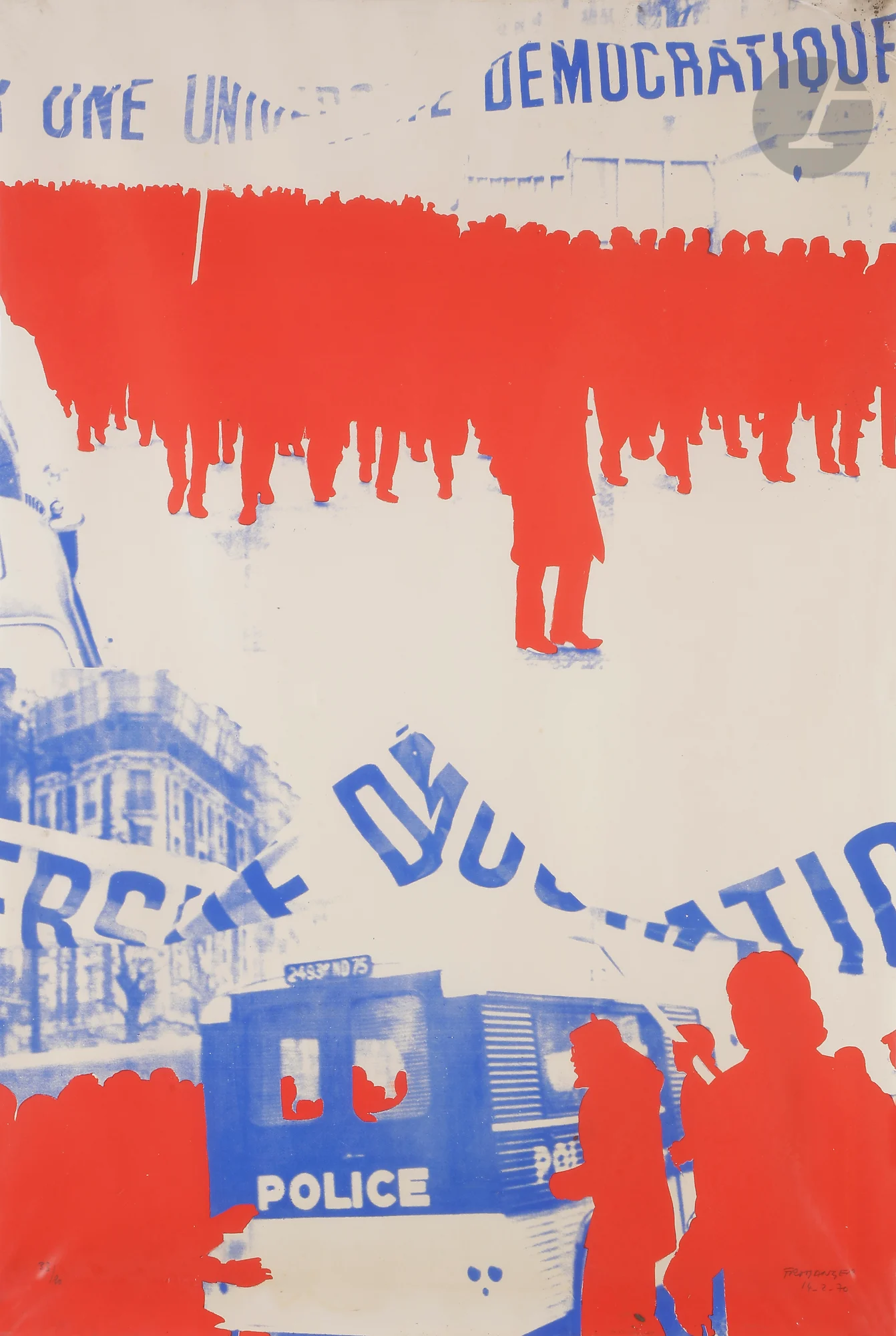
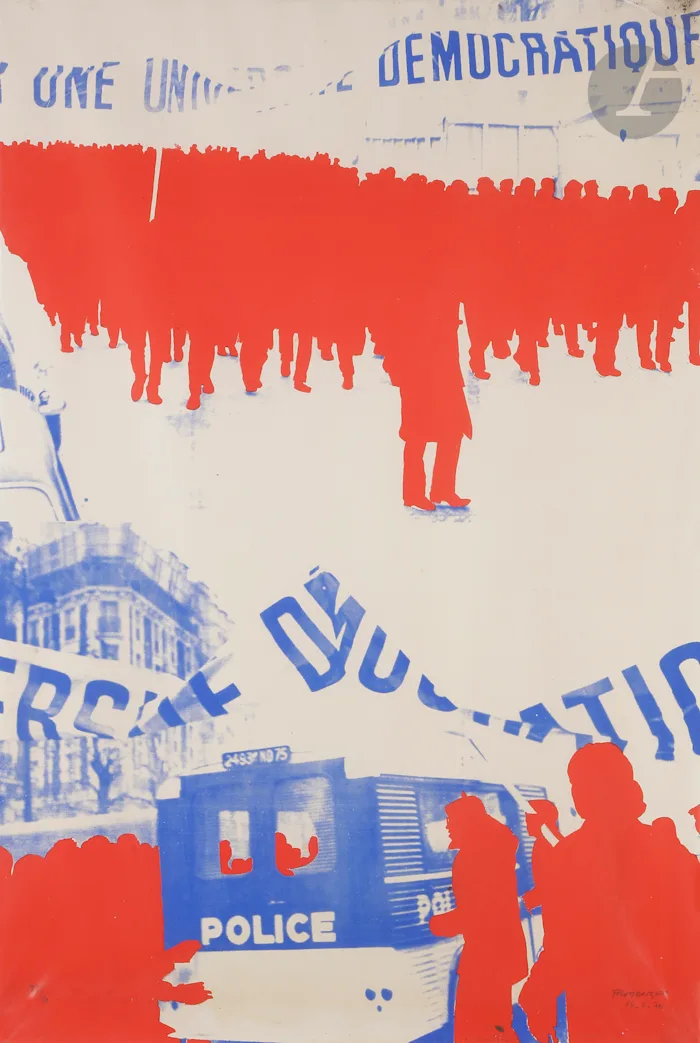
By going on hunger strike last winter, incarcerated political activists gave new form to what was still but a voiceless discontent. They marshaled many prisoners around their action; outside, they instigated a movement against the conditions of detention; and on bothsides of the prison walls, they made it possible for people to gather together, people who wanted to struggle against the same intolerable reality: a justice system indentured to the ruling class. It is here that the inquiry on prisons takes place.
This booklet is not a report: it forms an integral part of the inquiry’s unfolding. It aims to give prisoners from different prisons the means of taking the floor [prendre la parole] together regarding conditions of detention, incarceration, and release.
It aims also to penetrate prisons and reveal what is happening there right now — abuses, suicides, hunger strikes, agitation, revolts. The questionnaire was drafted with former prisoners and modified beginning with the first responses. Presently, almost a thousandquestionnaires are in circulation.
It has permitted the formation of inquiry groups, gathering former prisoners, their families, various penitentiary employees appalled by their work, lawyers, magistrates, students, and intellectuals around a number of prisons.
It has been distributed by these groups at prison doors and in visitors’ queues. Despite the censorship of visiting rooms, some families have become inquirers themselves, thus making known within prison the action undertaken outside.
In order to distribute information as quickly as possible, we drafted this booklet starting with the first questionnaires:
As an example, two completed questionnaires have been reproduced in full;
Two narratives, which follow the order of questions posed by the questionnaire, have also been transcribed;
The most characteristic responses have been gathered under the questionnaire’s principal categories.
Starting with these documents and others still to be published, different campaigns will be organized to denounce the appalling conditions of detention and the entire judicial system that produces and sustains them. Among the immediate demands of prisoners and their families, the abolition of criminal records assumes first rank.
From the outset, a criminal record discredits the hypocritical pretention that prison is a place of reeducation;
Every day, the state judges the value of its own penitentiary system by banning civil-service access to those holding a criminal record;
The judicial system contravenes the right to work: it condemns former prisoners to unemployment, to the arbitrariness of employers, and to the most exploited work;
With a criminal record, there is no release, there are only reprieves. The abolition of criminal records will be the theme of our next campaign.
-The Prisons Information Group3
The Great Confinement4
Niklaus Meienberg: Does a relationship exist between your structuralist, philosophical works and your engagement in the GIP?
Michel Foucault: First of all, I am not a structuralist, I never said I was a structuralist, in fact I have always insisted that I am not a structuralist, and I’ve revisited the issue several times. Nothing, absolutely nothing in what I have published, nothing in my methods or in my concepts, evokes, even from a distance, structuralism. You would have to be named Piaget to imagine I am a structuralist.
Then where does it come from — this general conviction that you are a structuralist?
I suppose it is a product of stupidity or naïveté.
Was it Piaget who labeled you a structuralist philosopher?
I hardly think so; he is not capable of it, poor fellow. He never came up with anything himself.
So, let me say this: the relationship between your engagement in the GIP and, quite simply, your philosophical work. Or would you prefer to be characterized as a historian?
Decide for yourself! I have claimed neither one characterization nor the other. I would like you clearly to emphasize what I said about structuralism: that is, I am not a structuralist, I havenever been one, and only the foolish and naive — let’s call them Piaget — can claim that I am. The foolish, the naive, and the ignorant. Usually, this label is utilized by those who lost their contemporary relevance, so they judge others. But these considerations are hardly of interest, let us speak rather of serious things.
By all means.
I would really like us to establish no relationship between my theoretical work and my work in the GIP. That is very important to me. But there probably is a relationship. What I studied in History of Madness had something to do with this singular phenomenon of Western society that, in the seventeenth century, they called “confinement.” I think one of the most unsettling pieces ever painted in the West is Frans Hals’s The Regentesses5, an extraordinary work of which Claudel said some very beautiful things.6 It relates to a very original practice which was, in a certain sense, a brilliant invention of the classical era. End of the sixteenth, beginning of the seventeenth century. I believe we can identify different types of civilizations. There are civilizations that exile, namely, those that react to offenses or crimes, or even insufferable individuals, by chasing them from society, exiling them. Then there are societies that slaughter, societies that torture, that retaliate against these individuals by torture and the death penalty. And then there are societies that confine. I think not many societies of this type exist. You know, in the Middle Ages prisons were practically nonexistent; in that era, dungeons were preeminently a kind of court antechamber — they seized a person for collateral, in order thereafter to kill him, or punish him in some other manner, or to have him ultimately pay a ransom for his freedom. In that era, the dungeon was a passageway: passageway to death or to freedom, the latter being bought at a price. The idea that prison could be a punishment in itself was completely foreign to the Middle Ages, and practices of this kind did not exist in medieval society. It is only when capitalism, in its early stages, found itself confronted with new problems, above all those of the workforce and the unemployed, and when societies of the seventeenth century saw great, popular insurrections, in France, in Germany, etc., in England too — only at that moment did they resort to confinement. Why?Because the old method of repressing insurrections no longer seemed appropriate. Up until that point, they would normally send a mercenary army simultaneously to slaughter people and destroy property, in a kind of parallel invasion that affected the wealthy and poor equally. This was an absolute massacre, the army stayed in the country for weeks or months, devouring everything, it made a clean sweep, the big landowners could no longer bring in property taxes, it was a general economic catastrophe. Thus, they invented the prison to ultimately obtain a differential result, namely, prisons permitted them to eliminate, as dangerous, a select portion of the population, yet without this elimination having catastrophic economic consequences, as in the case of invading insurgent regions. A prophylactic, of some kind.
In the Middle Ages, dungeons and prisons already existed.
But they confined people only until they were judged, until they paid ransom, or until they were executed. The cells contained very few prisoners awaiting their destiny. Confinement en masse did not yet exist — not like in seventeenth-century Paris, where more than 6,000 prisoners were permanently confined. This was an enormous number in those days, for Paris contained but 300,000 inhabitants. Which had its demographic and economic consequences — for who was it that was confined? The vagabonds, the people without work and without home. To escape confinement, one had to practice a trade, accept salaried work, however poorly paid. Consequently, the lowest salaries were stabilized by the threat of incarceration. Obviously, the political and social consequences were important; for they could eliminate all the so-called agitators in this way. Thus, it was an extraordinarily elegant solution, if one can still speak of elegance here, a miraculous remedy in the period of nascent capitalism.
People were not taken to court; they were incarcerated directly.
Directly. Thanks to the police, an institution that was perfected in this era and fulfilled a quasi-judicial function. Its power was nearly absolute; in Paris, the police lieutenant had the power to confine mendicants and vagabonds without further ado.
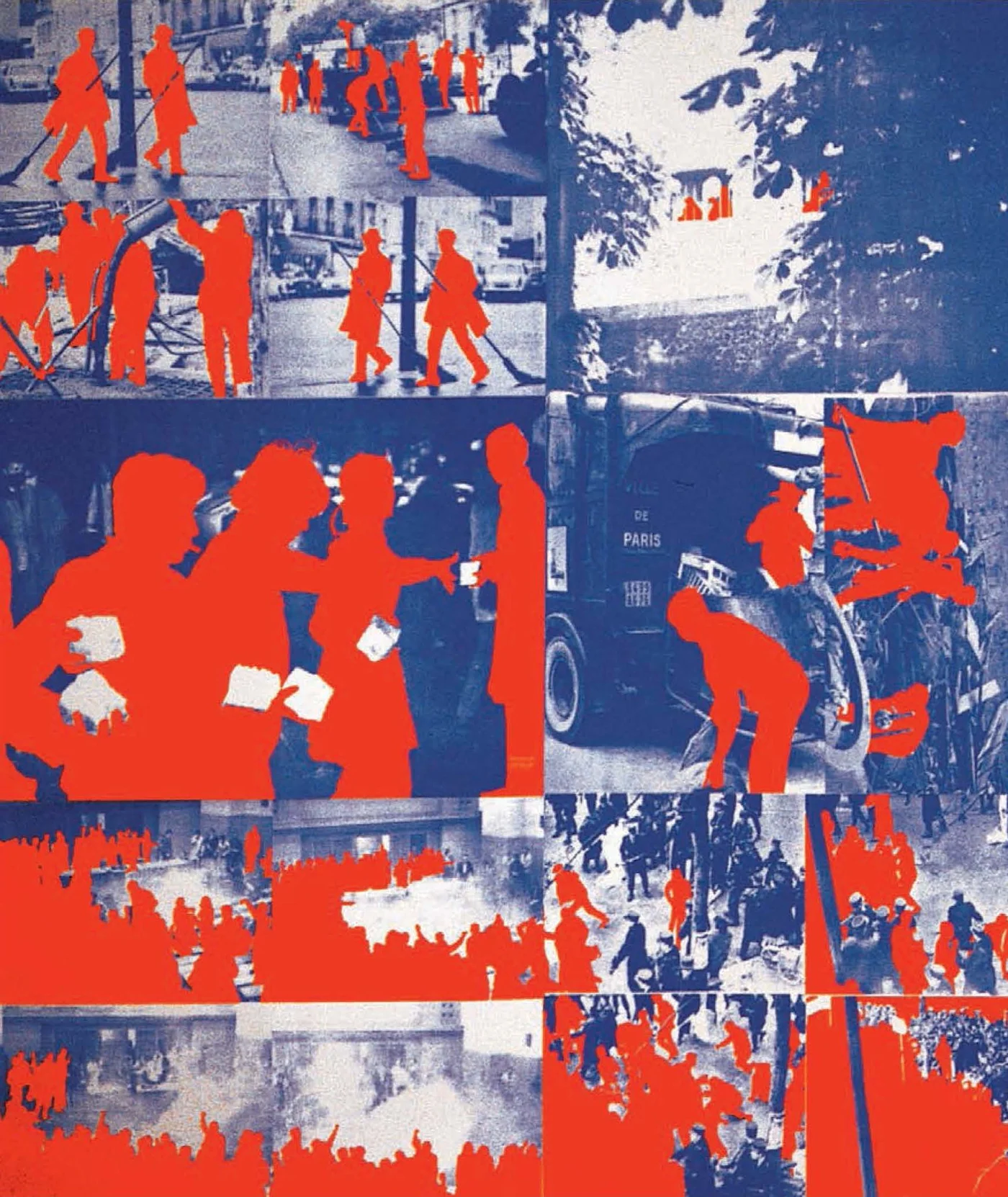
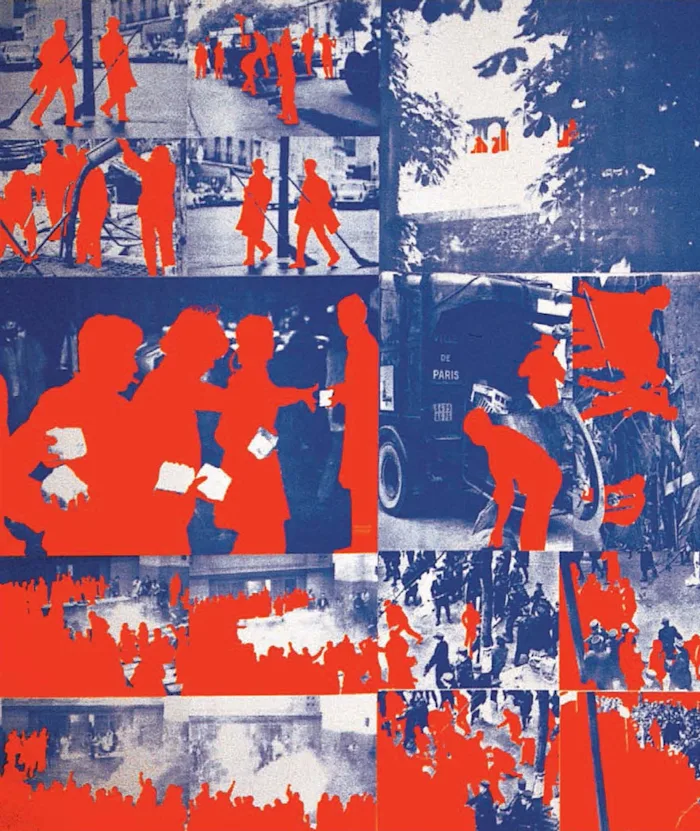
Speaking of the historical background you described in History of Madness, did you hit upon the present function of prisons after that?
I would have been much happier with some other research subject. After May ’68, when the problem of repression and of legal proceedings became more and more acute, it’s likely that it jolted me and rekindled a memory. For one had the impression, well before May ’68, that we were returning to the very general sort of confinement that once existed in the seventeenth century: a police force with extensive discretionary powers. In that era, they confined, without any discrimination, the old, the infirm, people who couldn’t work or wouldn’t work, homosexuals, the mentally ill, spendthrift fathers, and prodigal sons; they confined everyone together in the same place. Then, at the end of the eighteenth and beginning of the nineteenth century, in the era of the French Revolution, they made distinctions: mentally ill in the asylum, young people in the reformatories, delinquents in prison, to which they added a whole arsenal of discriminatory measures, residency prohibition, etc. And today, for reasons I still do not understand very well, they are returning to a kind of general, undifferentiated confinement. The Nazi concentration camps introduced a bloody, violent, inhumane variant of this new confinement — Jews, homosexuals, communists, vagabonds, Gypsies, political agitators, workers, everyone in the same camp. And today, we see the same thing take shape in a more discrete, more shrouded form, in an apparently scientific manner. The famous psychiatric asylums of the Soviet Union are beginning to function in this way. All these institutions that, in France, appear so humanitarian, so medical, and so scientific — the prophylactic centers, youth centers, and schools — are overseen and directed by people who look like social workers, educators, and doctors, but who are, in the end, police: in this broad range of professions, so different in appearance, one notices a common function that links them together: the turnkey. All of these professions have as their common function surveillance, the maintenance under lock and key of marginal existences that are neither really criminal nor really pathological.
At first glance, the range of discriminations at the beginning ofthe nineteenth century led to a humanization: the mentally ill and so-called problem kids were separated from delinquents proper. But, on the other hand, the schema of the prison was extended to schools, asylums, and barracks.
Let’s say that the technique of confinement has been generally applied. Equally across asylums, barracks, and schools… For example, at the Collège de France, we presently offer a seminar on medicolegal affairs. In 1835, one can already see lawyers defending murderers who are obviously mentally ill. They tell the judges: “The main thing is to confine this sort of person. It matters little whether that be in the prison or in the asylum, as far as my client is personally concerned. If I ask you to give preference to the asylum, it is so that his family’s honor would not be tarnished.” One clearly sees that, in the eyes of a lawyer, in 1835, there is no difference between being imprisoned and being committed to an asylum.
If I understand you correctly, another form of confinement was forcing vagabonds to work and putting them in factories. Others were sent to the barracks, with an eye to the conquest of new markets in these early stages of imperialism. Have you noticed a correlation between the development of productive forces, in Manchester capitalism, and different techniques of confinement?
For me, that is one of the enigmas posed by penal proceedings in the West. The great confinement has generally been practiced in capitalist societies. It is something very archaic and unjustified, its consequences are demonstrably costly. Everyone knows that presently, in France, there are 30,000 prisoners, of which about 3,000 to 4,000 are criminals, properly so-called. The rest are petty thieves or people who wrote bad checks, small fry; for them, clearly one does not need to use the costly, archaic, and ungainly methods of confinement. You have, then, an enormous carceral organization of which you might ask whether it ultimately corresponds to an economic need because at the strictly penal level its existence is unjustified. If you consider that, besides the 30,000 permanent inhabitants of the prison, 100,000 per year pass through it and the same 100,000 regularly return, then you see that in France, grosso modo, 300,000 people pass in and out of prison.7 That does not represent even 1 percent of the French population. From an economic perspective, then, you don’t see what good it does to subtract 300,000 people from a population of 50 million. Compared, for example, to the number of car accident victims, prisoners hold no weight. And yet, society finds them vastly important. It has this costly apparatus of prisons and prison guards, and, when we wantto critique it, when we want to show its absurdity, people in power react with incredible vigor! The entire society reacts, too, and this gives rise to press campaigns.
Perhaps, within “innocent” people, there is a profound psychological need for scapegoats, ultimately to foreground their “innocence” against the backdrop of prisoners’ culpability.
I don’t know. There is surely a reason. At present, within the confines of my university work, I am occupied with the penal system of the Middle Ages. And recently — perhaps I am a little naive for not having seen it earlier — I’ve found the snag: at issue is the confiscation of goods. The penal system of the Middle Ages contributed, almost more than the bank, to the circulation of goods. This was one of the determining factors in the establishment of royal power. Because royal power, to the degree that it was also judicial power, retained either the whole or a large portion of confiscated goods. And the extension of royal power, which is to say the establishment of absolute monarchy, the concentration or, at the very least, the control of a great part of national wealth by royal power, this entire process was accomplished via the penal system. That I can understand. But in our day, that is no longer really the case. The portion of goods confiscated by today’s penal system is utterly negligible. I am looking for reasons, but still do not see them clearly. The role of the medieval penal system was nearly as important as the prohibition of incest in primitive societies. The prohibition of incest equally had as its goal the circulation of goods, notably the dowry and the paraphernalia.8
Why do you say you would prefer to be occupied with historicalwork that would not lead you back into the vicinity of the modern execution of punishments?
Guess!
It is a mystery to me. A scientific work that organically leads to the praxis of the present is still more useful than producing essays for specialists and snobs.
If I occupy myself with the GIP, it is only because I prefer effective work to university yakking and book scribbling. To write a sequel today to my History of Madness, one that would cover material up to the present era, is devoid of interest for me. On the other hand, a concrete political action in favor of prisonersappears to me charged with meaning. An aid in the struggle of prisoners and, ultimately, against the system that puts them in prison.
It strikes me as interesting to compare what you say at this juncture with your former declarations. In an interview, in 1966, you said: “We experienced Sartre’s generation as, of course, a courageous and generous generation, which had a passion for life, politics, and existence . . . But we discovered another thing, another passion: a passion for the concept and for what I will call the ‘system.’”9At the time, that sounded like a profession of faith in favor of an apolitical, disengaged structuralism.
Since then, many things have fundamentally changed. This is probably because my generation has moved closer to that of Sartre. Less than a week ago, Sartre and I joined a demonstration before the Ministry of Justice to read publicly a manifesto sent to us by prisoners.10 Clearly, I have changed, but doubtless Sartre has also, because up until that point he had believed that what I had written was a refusal, a negation of history. Today, he no longer seems to believe that. Because I have changed? I don’t know.
They chased you from the Ministry of Justice. Would you like to speak to Pleven, the Minister of Justice?
We don’t speak to his kind. He deceived prisoners, he made promises he didn’t keep, he lied. It is absolutely useless to speak to Pleven. The demonstration before the Ministry of Justice had a symbolic value. There were two or three journalists, radio reporters, etc. But, naturally, our statement was not aired on the radio. That is typical of the system.
How can you struggle effectively against the present penal system if the information network suppresses your statements?
It is hard work. They said to me a thousand times: “Write an article on your ideal prison.” And a thousand times, I answered: “Shit, that doesn’t interest me.” On the contrary, if we pitch a text, drafted by prisoners, in which they say: “We want such and such,” newspapers won’t publish it. La Cause du peuple itself censored a prisoner’s text. The piece didn’t correspond to their ideas, they preferred revolts on roofs. When prisoners speak, it poses such a problem. The text I read with Sartre was not published by La Cause du peuple. Because, as soon as prisoners speak, we are at the heart of the debate. The first step to take, then, is to give the floor to prisoners.

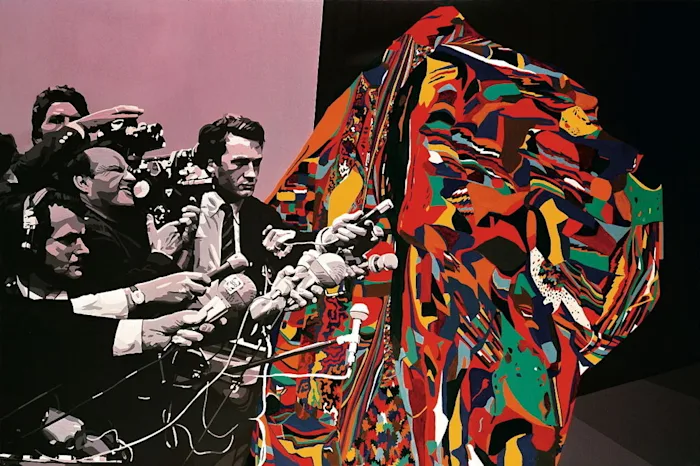
Currently, members of Secours Rouge are distributing GIP tracts in the marketplace. In doing so, they noticed that moderate people, who manifested sufficient comprehension of Secours Rouge’s antiracist campaign, were no longer compelled by the campaign on prisons. They heard reactions like: “Do we have to build four-star hotels for these crooks?”
It is utterly apparent that the proletariat is itself the victim of crime. Old folks obviously have no particular tenderness for the sort of young delinquent who steals their last bit of savings because he wants to buy a Solex. But who is responsible, in the first instance, for the fact that this young man doesn’t have enough money to buy a Solex and, in the second, for the fact that he has such a strong desire to buy one? The nineteenth century practiced its specific type of proletariat repression. The proletariat was accorded diverse political rights, freedom of assembly and union rights, but, conversely, the bourgeoisie obtained the promise of good political behavior and the renunciation of open rebellion from the proletariat. The popular masses could exercise their meager rights only by complying with the rules of the game established by the ruling class. In this way, the proletariat interiorized a part of bourgeois ideology. The part concerning the use of violence, insurrection, delinquency, the subproletariat, and the margins of society. Today, we see the first reunion, the first reconciliation between a portion of the proletariat and the nonintegrated portion of the marginal population.
On the contrary, if we consider the reactions of the CommunistParty, we get the impression that the segment of the proletariat that has a political consciousness neatly distances itself from the subproletariat, the marginal population.
That is correct in a certain sense. Ideology puts more and more pressure on the working class. This ideology of order and virtue, of the acceptance of laws, of what is decent and what is not. It’s true that this ideology is more and more interiorized. And yet, surprisingly, the violent marginal strata of the plebeian population are regaining their political awareness. For example, there are these young gangs in the projects, in some districts of Paris, for whom their criminal status and their marginal existence take on a political significance.
Does the fact that delinquents openly stand on the ground of their delinquency allow us to conclude they have a political consciousness?
This consciousness exists. In Renault, for example, there are today perhaps more than a thousand young workers who have a criminal record. Up until recently, they hid it, they were ashamed of it, and no one knew anything about their past. Today, they are starting to talk about it. And they explain that, because of their criminal record, they have difficulty finding work, or they have difficulties after finding work, or they explain that those who have already been convicted are always the first to be laid off, or to be assigned the meanest work. It is an entirely new phenomenon, which is linked to the appearance of new plebeians. Or again, take the former prisoners who, in a public gathering at Nancy, took the floor [pris la parole]to speak about their detention. There were public meetings at Nancy, Toul, Lille, Poitiers, and prisoners often took the floor there. They mounted the platform to say: “I spent two years in this prison, or five years in that.”
Let’s take, for example, the meeting last Wednesday at La Mutualité. The audience was composed of noisy sympathizers, a milieu heavily defined by young leftists.
This meeting was at once interesting and deceptive. Because, for the first time in Paris, there were ten or twelve former prisoners, introduced by name, who spoke out in public to express what they thought of their detention. On this score, it was singularly interesting. It was also deceptive, because currently a kind of four-year-old tradition exists: We go to La Mutualité, or, as they say, to La Mutu, there is always the same leftist audience, which, moreover, behaved even more badly that evening than usual. Naturally, they were unimpressed. A quarter of them didn’t stop chattering, coming and going, the normal mess at La Mutu. What happened before their eyes was all the same to them, the main thing was to be at La Mutu. The gathering had not been organized by the GIP. When we organized something in November, the audience was a little different.11 The local discussions in youth centers and clubs, villages, small circles, the marketplaces seem more interesting tous. They are more fruitful. The leftist ritual is sterile. These kinds of mass gatherings are no more the barometer of revolutionary mobilization than 11 o’clock village Mass is a barometer for the intensity of faith.
You also said, in an interview in 1966: “...we are returning to the seventeenth-century perspective, but with this difference: putting in God’s place not man, but an anonymous thought, knowledge without a subject, and the theoretical without identity.”12If we start from this theory, can we still be active in the political realm, given that the subject is abolished? It seems to me that the logical consequence of such a position would be a feeling of lethargy and impotence, of standing by knowledge and renouncing action, in brief: structuralist contemplation.
On the contrary, it only signifies the renunciation of personalization; it does not signify immobility. To the GIP, that means: no organization and no leader, they really do everything for it to remain an anonymous movement that exists only by the three letters of its name. Everyone can speak. Whoever the one speaking might be, he does not speak because he has a title or a name, but because he has something to say. The GIP’s only watchword is: “Speech to the prisoners!”
You said in 1966: “The task of current philosophy…is to bring to light this thought before thought, this system before any system.”13
OK, don’t constantly go back to things I said before! When I say things, they are already forgotten. I think in order to forget. Everything I said in the past is absolutely without importance. One writes something when one has already worn it out in one’s head; one writes the bloodless thought, voilà. What I wrote does not interest me. What interests me is what I could write and what I could do.
But you cannot stop your readers from reflecting on your previous ideas, or reflecting on their coherence. At what point in their development should we consider your ideas uninteresting and without importance for the Foucault who has continued to develop?
I really don’t care. What disturbs me, and the reason why your question makes me a little peeved, is that you could say: “Youalready said that,” or, “What you said there is the natural development of this other thought.” It bothers me when you suggest there is no relationship between History of Madness and my work in GIP. You could also list all the possible and imaginable sentences I might have written or said that would contradict what I do today, and I would respond to you simply: first, I don’t give a damn, and, second, it gives me pleasure. What I mean by that is I don’t feel either attacked or critiqued or embarrassed by the fact that I no longer say the same things as before. And that gives me pleasure, for that proves that I don’t have a narcissistic relationship to my discourse.
The issue is not to trap you in contradictions; in fact, what interests me is the idea that today you do the work of a philosopher.
You want to know my idea of a philosopher’s work? Philosophers don’t work! What characterizes the philosopher is that he distances himself from reality. He can’t come near it.
It would be a great time to abolish philosophy, and perhaps also philosophers!
Philosophy is already abolished. It is no more than a vague little university discipline in which people talk about an entity’s totality, “writing,” the “materiality of the signifier,” and other such things.
A couple of serious philosophers, who “totalize” as Sartre would say, still exist outside the university.
Yes. (Long silence.) Wherever Sartre totalizes, he distances himself from reality. And each time he grasps a determinate problem, has a determinate strategy, or struggles, he approaches reality.
The GIP’s fight, which you lead with Sartre and other activists, aims not at the center of society, the relations of production and appropriation, but at its periphery. Can the situation of prisoners change if, in France, the same class remains in power?
No. Why should they want to change detention conditions when they are in power? During the revolt staged at Toul Prison, we received messages of support from foreign countries. The most vigorous encouragement came from Uppsala Prison in Sweden. That means that the prison revolts put into question not details, like whether or not to have television or permission to play soccer, but, on the contrary, the status of the marginal plebeian incapitalist society. The status of the derelict. In our day, there are a large number of young people who want to be engaged in the GIP and with other problems of the marginal population. But what they lack are analyses. For, the Communist Party, or the French Marxist tradition in general, has hardly improved what services we extend toward marginal people, what we understand as their problems, and what we present as their demands. Leftists themselves have the greatest repugnance for doing this work. In the end, we need analyses of power in order to give meaning to this political struggle that is now beginning.
Do you know of a model prison?
No. But there do exist better prisons than those in France. In Sweden, fifteen years ago, on the road from Uppsala to Stockholm, I saw an establishment that resembled a very comfortable French school building. The problem is not a model prison or the abolition of prisons. Currently, in our system, marginalization is effected by prisons. This marginalization will not automatically disappear by abolishing the prison. Society would quite simply institute another means. The problem is the following: to offer a critique of the system that explains the process by which contemporary society pushes a portion of the population to the margins. Voilà.14
Translated by Perry Zurn and Erik Beranek
Intolerable: Writings from Michel Foucault and the Prisons Information Group is now available from University of Minnesota Press.


Images: Gérard Fromanger
Notes
1. This text served as the preface to the GIP’s first booklet, Intolérable 1: Enquête dans 20 prisons (Paris: Éditions Champs Libre, May 28, 1971). Although unsigned, it was overseen by Michel Foucault. [All notes have been added by the editors of the English language edition].↰
2. Compagnies Républicaines de Sécurité (CRS), special mobile French police force.↰
3. While this signature does not appear in Dits et écrits, it is retained in Le Groupe d’information sur les prisons: Archives d’une lutte (1970-1972), IMEC, 2003, and Groupe d’Information sur les Prisons, Intolérable, Verticales, 2013.↰
4. This interview with Michel Foucault conducted by Niklaus Meienberg originally appeared under the title “Die grosse Einsperrung” in Tages Anzeiger Magazin, no. 12 (March 25, 1972): 15, 17, 20, and 37. Reprinted in Dits et écrits, 1954-1988, Gallimard, 1994, 2: 105, 296-306. ↰
5. Frans Hals, Les Régentes (1664).↰
6. See Paul Claudel’s “Introduction à la peinture hollandaise,” inL’œil écoute (Paris: Gallimard, 1967), 9–68.↰
7. Foucault’s calculation here appears to be incorrect.↰
8. It is worth recalling that the term “paraphernalia,” commonly applied to various specialized accoutrements, originally referred to property owned by a married woman ( from the Greek para [apart from] and pherna [dowry]). ↰
9. “Entretien avec Madeleine Chapsal,” La Quinzaine littéraire, no. 5 (May 16, 1966): 14–15, reprinted in DE I, no. 37, 513–18 (where the passage quoted appears on 514) and DEQ I, no. 37, 541–46 (passage appears on 542).↰
10. For Foucault’s statement from the press conference held after this protest, see “It Was about a Year Ago,” in Intolerable. ↰
11. For the flier announcing this event, see “A Movement of Struggle Is Developing Today…”; For Daniel Defert’s speech from this meeting, see “On What Does the Penitentiary System Rely?” Both are collected in Intolerable.↰
12. See “Entretien avec Madeleine Chapsal.”↰
13. Ibid. ↰
14. Excerpted with permission from Intolerable: Writings from Michel Foucault and the Prisons Information Group (1970-1980) by Michel Foucault and Prisons Information Group; edited by Kevin Thompson and Perry Zurn; translated by Perry Zurn and Erik Beranek. Published by the University of Minnesota Press, 2021. Copyright 2021 by the Regents of the University of Minnesota. All rights reserved.↰